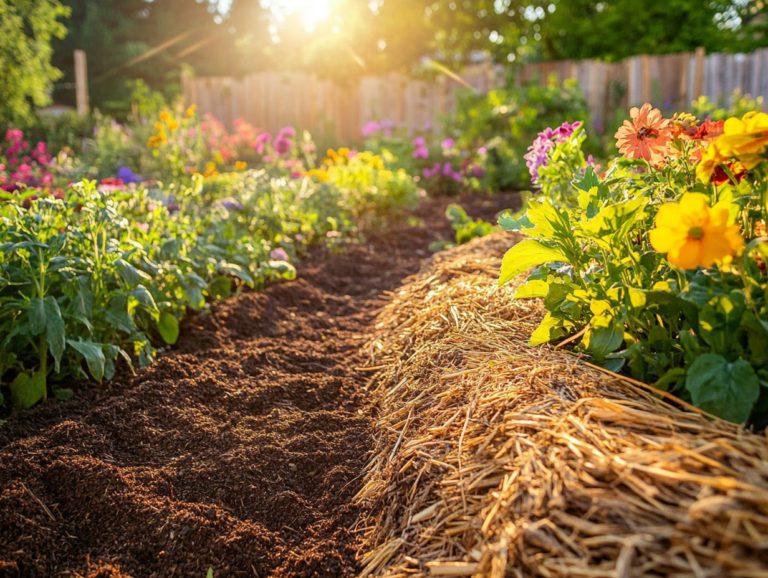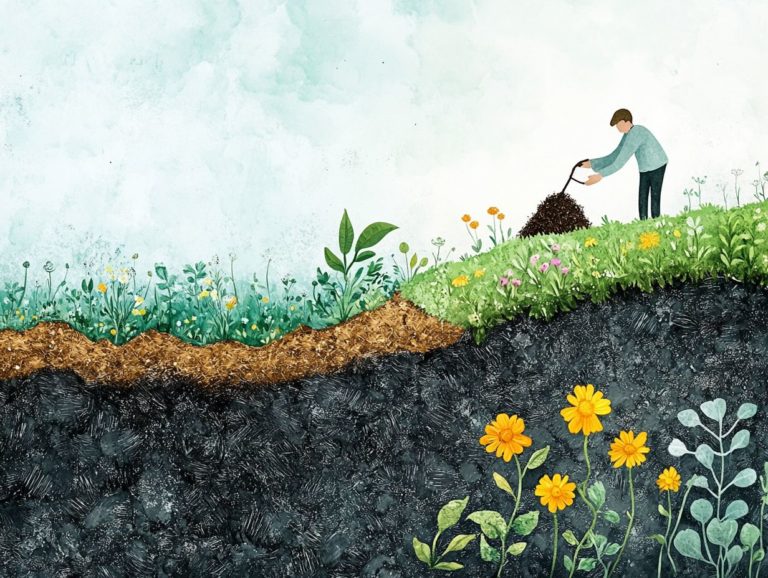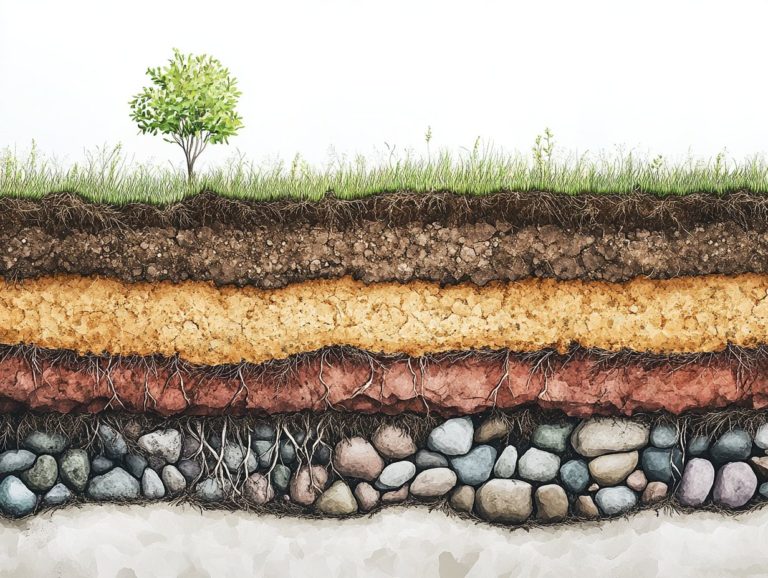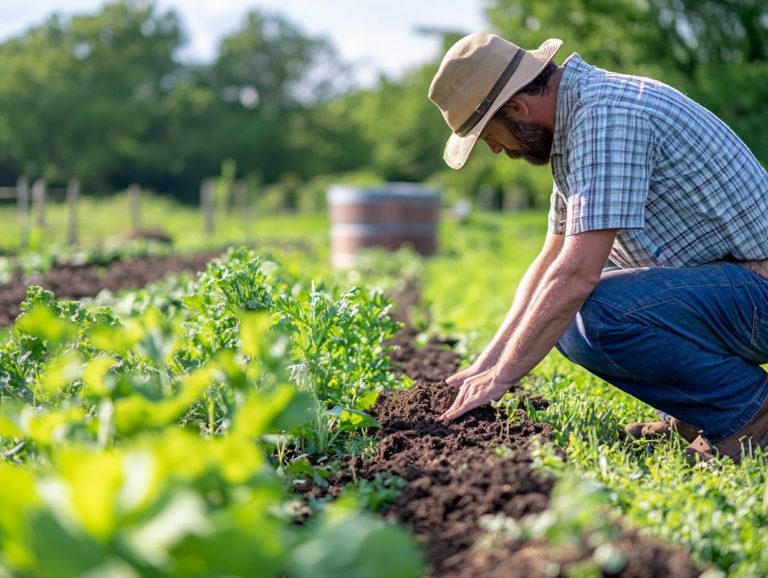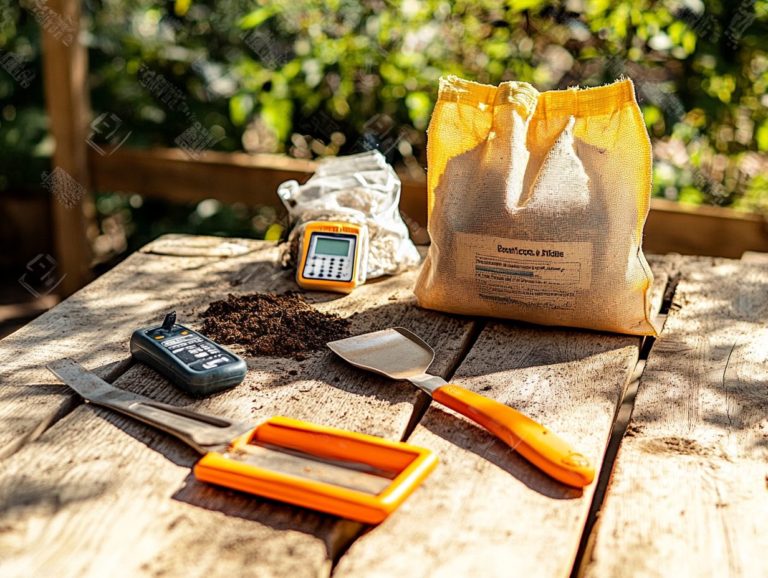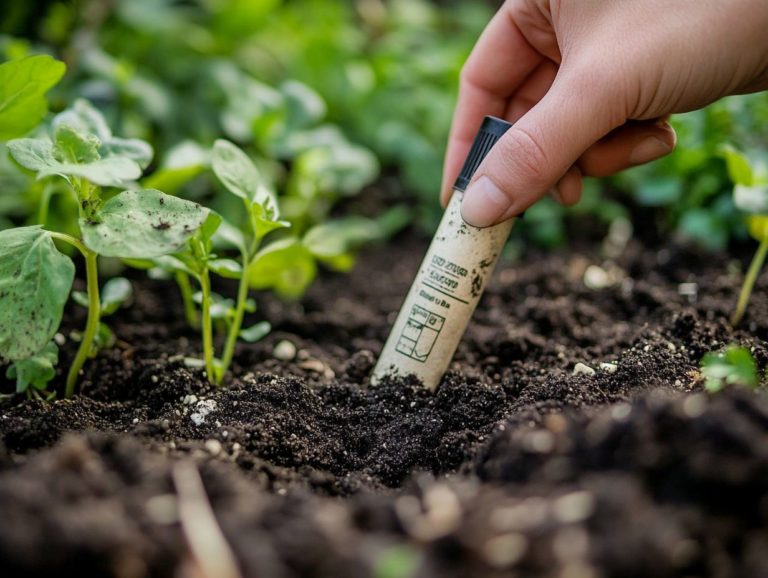5 Tools Every Gardener Should Have for Soil
Gardening is a rewarding journey, and your success often hinges on the health of your soil. Whether you re a seasoned horticulturist or just starting out, having the right tools can truly elevate your experience.
This article delves into five essential tools every gardener should possess, from soil pH test kits to compost bins.
You ll also learn about the significance of soil testing, effective techniques for utilizing these tools, and tips for maintaining nutrient-rich soil.
Get excited to boost your gardening skills and improve your garden care! Let s dig in!
Contents
- Key Takeaways:
- 1. Soil pH Test Kit
- 2. Trowel
- 3. Garden Fork
- 4. Soil Moisture Meter
- 5. Compost Bin
- What Is the Importance of Soil Testing in Gardening?
- How Can a Gardener Use a Trowel Effectively?
- What Are the Different Types of Garden Forks and Their Uses?
- How Can a Soil Moisture Meter Help with Plant Health?
- What Are the Benefits of Using a Compost Bin in Gardening?
- How Can a Gardener Maintain Healthy Soil for Their Plants?
- What Are Some Common Mistakes Gardeners Make with Their Soil?
- How Can a Gardener Make Their Own Compost at Home?
- What Are Some Natural Ways to Improve Soil Quality?
- How Can a Gardener Determine the Right Amount of Water for Their Soil?
- What Are Some Signs of Unhealthy Soil in a Garden?
- Frequently Asked Questions
Key Takeaways:
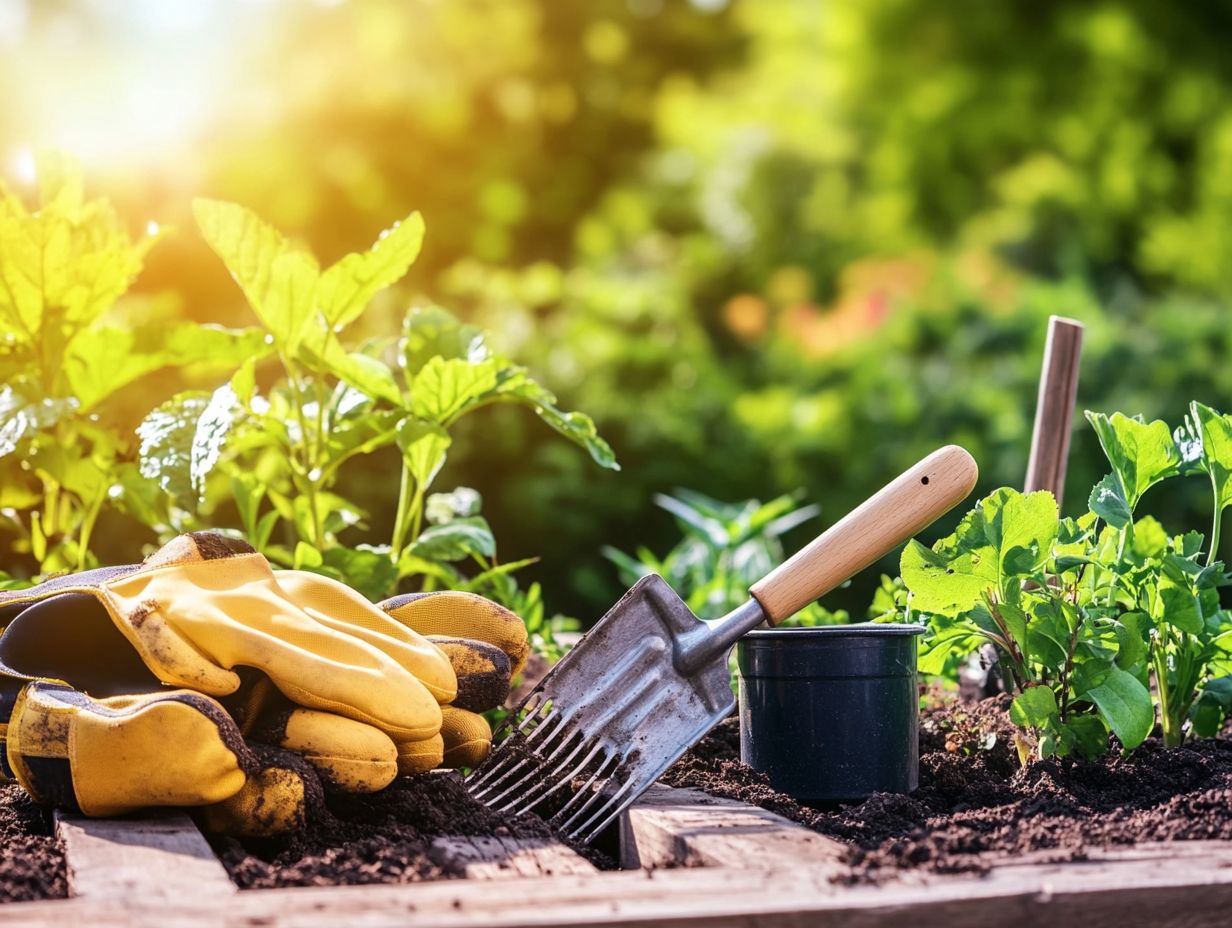
- A soil pH test kit is important for determining the acidity or alkalinity of soil, which is crucial for plant health.
- A trowel is a versatile tool for digging and planting in soil, making it a must-have for any gardener.
- Using a garden fork, along with other gardening tools, helps aerate soil and break up clumps, promoting healthy root growth and better drainage for plants.
1. Soil pH Test Kit
A soil pH test kit is an important tool for you as a gardener. It enables you to evaluate the acidity or alkalinity of your soil an essential factor for optimal plant growth.
Grasping the nuances of soil pH gives you the power to make informed decisions, as different plants flourish at varying pH levels. Accurate soil testing not only guides the effective use of garden chemicals but also ensures healthier plants and improved yields.
By using a soil pH test kit, you can precisely determine whether your soil is acidic, neutral, or alkaline conditions that directly influence nutrient availability and plant vitality. For example, most vegetables and flowers thrive in a slightly acidic to neutral range, typically between 6.0 and 7.0.
Familiarizing yourself with the specific needs of your plants allows you to amend your soil effectively, whether that means adding lime to increase pH levels or sulfur to decrease them. Regular testing cultivates a flourishing garden and helps avert issues like nutrient deficiencies or toxicities, which can arise from an imbalanced pH.
Ultimately, by attending to soil health through pH testing, you adopt a proactive approach that promotes sustainable gardening practices for years to come.
2. Trowel
A hand trowel stands out as one of the most essential gardening tools, crafted for a variety of tasks like digging, planting, and transplanting. Its role makes it a cornerstone for your garden care and maintenance routine.
When choosing a hand trowel, you ll want to pay attention to the unique designs available. Many feature ergonomic handles that offer comfort during those long hours of digging and planting.
Different styles, such as stainless steel or fiberglass, cater to your personal preferences and specific tasks, enhancing both performance and ease. For instance, opt for a wider blade to scoop up soil or compost, while a narrower one is perfect for those precise planting jobs among existing flora.
Keep your hand trowel reliable by cleaning and sharpening it regularly. This simple care routine will guarantee its longevity, keeping it by your side for many seasons to come.
3. Garden Fork
A garden fork is an important tool in your gardening arsenal, playing a crucial role in soil aeration, turning compost, and breaking up compacted soil. This not only enhances your garden’s maintenance but also cultivates a flourishing environment for your plants.
Understanding the various types of garden forks can dramatically boost your efficiency and results. Take, for instance, the broadfork it’s particularly adept at loosening soil without disturbing its structure, allowing good bacteria to thrive. On the flip side, a specialty fork, such as a digging fork with sharp tines, excels at breaking through tough, compacted ground, making the task of preparing new planting beds a breeze.
In terms of weeding, you can use a fork to uproot those invasive plants by loosening the soil around their roots, ensuring a thorough removal. For optimal results, it’s wise to select the right fork for each task and employ the correct technique think smooth, even pressure when breaking up soil or weeding.
This approach not only maximizes your efficiency but also promotes healthier plant growth over time.
4. Soil Moisture Meter
A soil moisture meter is an essential gardening tool for you as a gardener. It allows you to accurately gauge the moisture content of the soil and ensures your plants get the right amount of water for optimal growth.
This device works by inserting a probe into the ground. It measures electrical resistance or capacitance and provides you with an accurate reading of soil moisture levels. With this valuable information, you can make informed decisions about when and how much to water your plants, fostering healthier growth.
You’ll find various types of meters available, including analog, digital, and even smart meters that sync with mobile apps. Each type comes with unique features tailored to different gardening needs, giving you the power to maintain your garden more effectively while minimizing the risks of over- or under-watering both of which can lead to plant stress and poor health.
5. Compost Bin
A compost bin is a cornerstone of sustainable gardening. It offers you a dedicated space to transform garden waste into nutrient-rich compost that can significantly enhance soil health.
By recycling your kitchen scraps and yard debris, you not only reduce landfill waste but also support a natural ecosystem that nurtures plant growth. Utilizing a compost bin enables you to manage your organic waste effectively, ensuring it decomposes into valuable material that feeds your plants.
When setting up your compost bin, choose a convenient spot with good drainage. This helps manage moisture effectively.
Layering food scraps with dry leaves promotes aeration and accelerates the decomposition process. Turning the compost regularly maintains an even temperature and moisture level, creating an ideal environment for beneficial microorganisms to flourish.
With proper care, your compost bin can become your garden’s best ally, boosting both its health and productivity.
What Is the Importance of Soil Testing in Gardening?
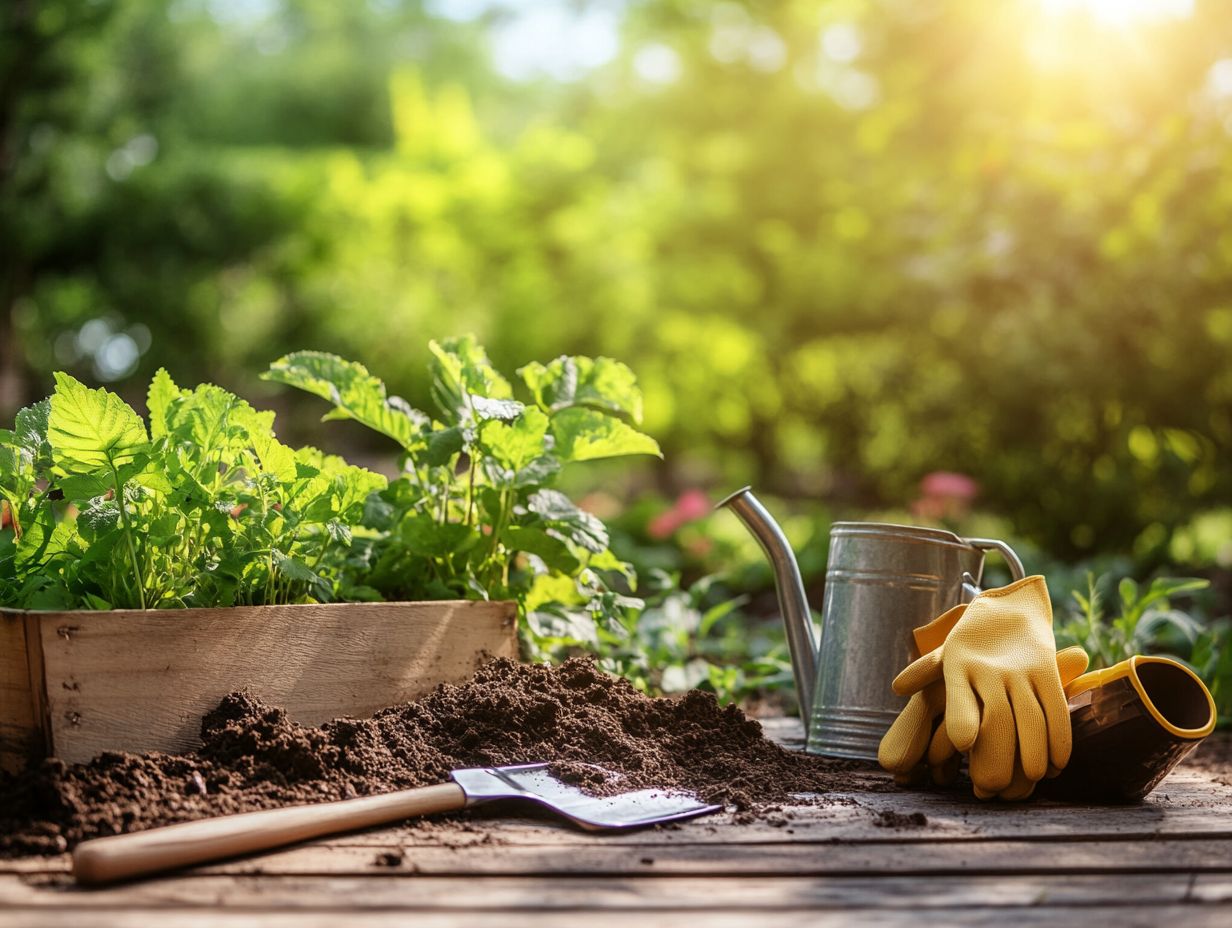
Soil testing is essential for your gardening success. It offers valuable insights into the nutrients and pH level of your soil. This knowledge empowers you to make informed decisions that enhance plant health and streamline garden maintenance.
By understanding your soil s needs, you can choose the best gardening tools and additives. This ensures optimal growth for a variety of plants while promoting sustainable gardening practices.
Collect samples from different garden areas to begin testing. You can analyze these samples using methods like pH testing strips or sending them off for laboratory analysis. Tools such as soil probes and moisture meters can help you obtain accurate readings.
The advantages of soil testing go far beyond mere numbers; they can significantly influence your crop yield. When your soil is well-balanced, your plants are healthier and better equipped to resist diseases.
This practice not only enhances your garden management but also supports sustainable gardening by reducing the overuse of fertilizers and pesticides, ultimately contributing to a more eco-friendly environment.
How Can a Gardener Use a Trowel Effectively?
To harness the full potential of a hand trowel and other essential gardening tools, prioritize proper technique and ergonomics. This ensures that your planting, digging, and weeding tasks are both comfortable and efficient.
Begin with a solid grip. The key is to hold the handle securely without overexerting yourself, allowing for precise control. When planting, angle the trowel’s blade slightly to glide effortlessly through the soil. For tackling weeds, insert the trowel at the base of the plant and gently leverage it back to dislodge the roots.
Once you’ve completed your gardening duties, it s essential to clean the trowel with water and mild soap to stave off rust and soil buildup. Be sure to dry it thoroughly before storing.
An ergonomic design in gardening tools is your ally. It distributes pressure evenly across your hand and minimizes the risk of cramps and fatigue during extended gardening sessions, making each experience all the more enjoyable.
What Are the Different Types of Garden Forks and Their Uses?
There are several types of garden forks available, each meticulously crafted for specific tasks such as digging, making soil loose and airy, and breaking up clumps.
These tools are critical for maintaining a thriving garden. Understanding the unique features of each type can significantly elevate your gardening efficiency.
For example, a digging fork, with its robust tines, is ideal for loosening compacted soil. On the other hand, a pitchfork excels at handling loose materials like hay or straw.
Alternatively, a border fork is more compact and perfect for navigating tight spaces, allowing you to weed around delicate plants with ease.
When it s time to select the right fork, consider your specific gardening tasks. The type of soil, its depth, and the variety of plants should all play a role in your decision.
By choosing the appropriate fork for each job, you can enhance soil aeration and foster healthier plants, leading to greater gardening success.
How Can a Soil Moisture Meter Help with Plant Health?
A soil moisture meter can greatly enhance your plant health by providing precise readings of soil moisture levels.
This enables you to optimize your watering strategies. By interpreting these readings, you can make informed decisions about when to water.
Ensure your plants receive just the right amount of moisture, avoiding the pitfalls of overwatering or letting them dry out.
Each plant has its own unique moisture requirements, and different types of gardens whether they re vegetable patches, flower beds, or succulent arrangements may require varied attention.
By following the insights offered by the moisture meter, you can maintain optimal moisture levels that foster healthy growth and reduce water waste.
This level of precision in your care can lead to vibrant blooms, more abundant yields, and a resilient garden ecosystem that flourishes beautifully.
What Are the Benefits of Using a Compost Bin in Gardening?
Using a compost bin in your gardening journey brings a wealth of benefits. It helps you reduce garden waste and enriches your soil with essential nutrients.
This practice promotes sustainable gardening methods that are good for the planet.
Beyond these perks, composting also helps in environmental preservation by cutting down landfill waste and reducing greenhouse gas emissions.
Mastering effective composting techniques like maintaining a balanced mix of green and brown materials and ensuring regular aeration is key to creating nutrient-rich compost.
This organic material doesn’t just improve soil structure; it also boosts its moisture retention, making your garden more resilient during dry spells.
By incorporating compost into your gardening routine, you re fostering a healthier ecosystem and attracting beneficial microorganisms that enhance plant growth. Enjoy the transformation!
How Can a Gardener Maintain Healthy Soil for Their Plants?
Maintaining healthy soil is essential for your gardening success. It provides the necessary nutrients and structure that support plant growth.
You can adopt various practices to boost soil vitality. For instance, composting enriches your soil with organic matter, while mulching helps retain moisture and suppress weeds.
Crop rotation is another effective strategy. By changing the types of plants grown in a specific area each season, you prevent nutrient depletion and minimize pest buildup.
Conducting soil tests is crucial for understanding your soil’s specific needs. These tests reveal pH levels and nutrient availability, influencing how well your garden thrives.
Together, these approaches contribute to a sustainable gardening ecosystem, enabling your plants to flourish and ensuring long-term soil health.
What Are Some Common Mistakes Gardeners Make with Their Soil?
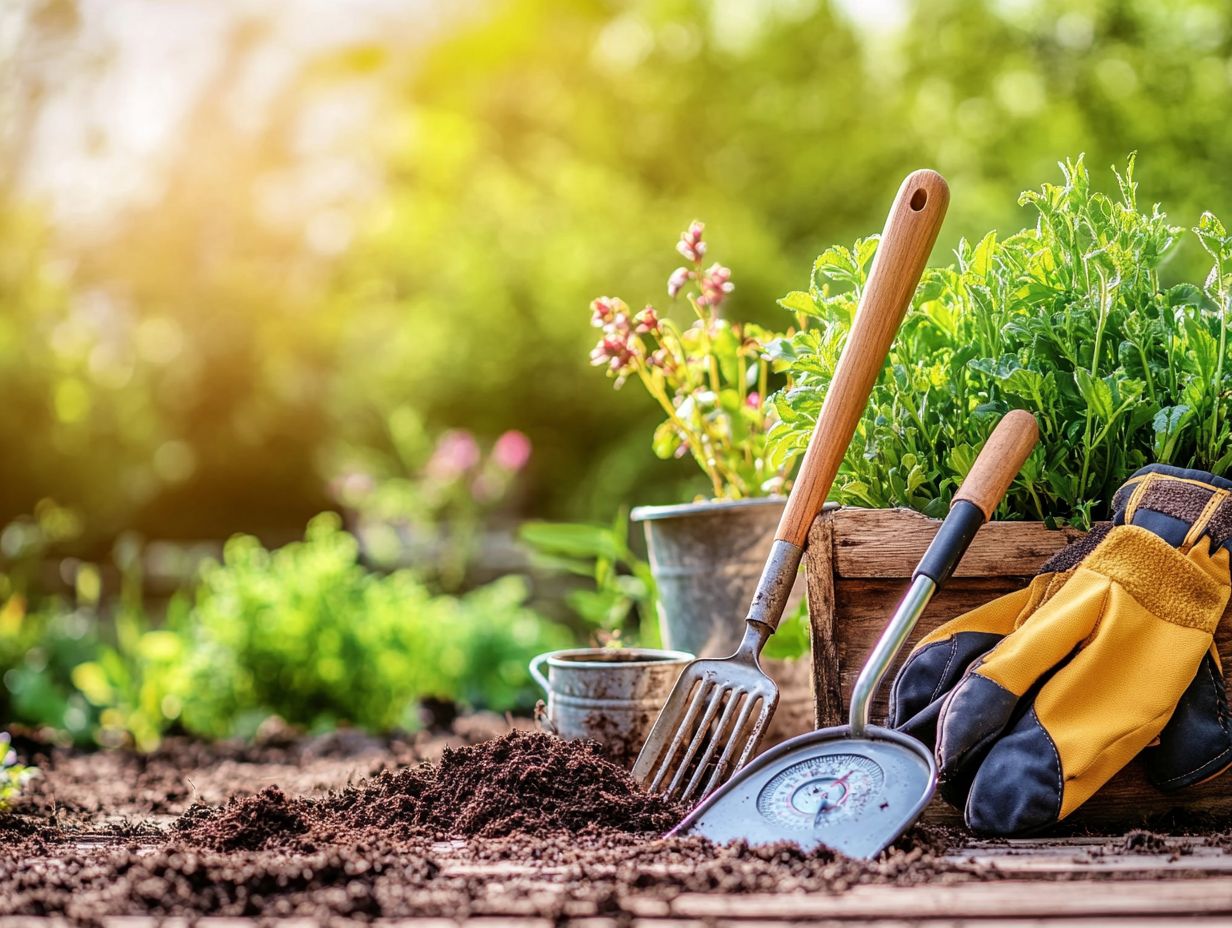
Common mistakes you might encounter as a gardener with your soil include neglecting to conduct soil tests and failing to amend your soil with the necessary nutrients. Each of these oversights can significantly hinder plant growth.
Over- or under-watering is another common error that complicates garden maintenance. These mistakes can also cause wrong pH levels and nutrient deficiencies, which detract from the overall health of your garden.
Understanding the composition of your soil is crucial. Conduct regular tests so you can tailor amendments to meet your plants’ specific needs.
Recognizing signs of over-watering, like yellowing leaves, can help you prevent root rot. Ensuring proper drainage tackles issues stemming from under-watering. Adopt these strategies to cultivate a vibrant landscape that thrives all year!
How Can a Gardener Make Their Own Compost at Home?
Start creating your own compost at home today by utilizing your kitchen scraps and garden waste in a compost bin. This establishes a sustainable nutrient source for your plants.
Incorporate materials like fruit and vegetable peels, coffee grounds, eggshells, grass clippings, and dried leaves to kickstart the composting process. It’s crucial to maintain a balance between greens those nitrogen-rich materials and browns, which provide carbon.
To achieve optimal decomposition, turn the compost pile regularly, every few weeks, ensuring it remains moist but not soggy.
This homemade compost enriches your soil with essential nutrients and enhances microbial activity. It promotes healthy root development and helps retain moisture. The result? Thriving plants and a healthier garden ecosystem!
What Are Some Natural Ways to Improve Soil Quality?
Improving your soil quality naturally is within your reach through methods like composting, using organic fertilizers, and implementing crop rotation.
These practices enhance soil structure and boost fertility, setting the stage for thriving plants. By incorporating these techniques, you can cultivate a vibrant ecosystem that nurtures plant health.
When you add well-decomposed compost, you elevate nutrient levels and improve moisture retention, inviting beneficial microorganisms to your garden!
Utilizing natural amendments such as bone meal or kelp provides essential minerals and promotes robust plant growth. Practicing crop rotation prevents nutrient depletion by alternating crops with varying nutrient needs, safeguarding your soil’s health.
Don t overlook cover crops like clover and rye. They enrich the soil by fixing nitrogen and minimizing erosion, creating a more sustainable gardening environment. Transform your garden into a thriving oasis with these strategies!
How Can a Gardener Determine the Right Amount of Water for Their Soil?
Determining the right amount of water for your soil is essential for maintaining plant health. Tools like a soil moisture meter can help you avoid common watering blunders.
By regularly checking moisture levels, you ensure your plants receive the right amount of water, effectively preventing overwatering and underwatering.
Align these adjustments with your plants’ specific needs and the ever-changing weather conditions.
During those hot, dry spells, your plants will generally crave more frequent watering. Conversely, cooler, rainy periods might call for a reduction in your watering routine.
Establish a consistent watering schedule while remaining adaptable to immediate weather and soil conditions. This promotes robust plant growth and vitality.
What Are Some Signs of Unhealthy Soil in a Garden?
Signs of unhealthy soil in your garden can show up in various ways: think poor plant growth, an explosion of weeds, and a lack of soil structure. These red flags suggest it’s time for some serious soil testing and fixing the soil’s health.
You might also notice nutrient deficiencies, which can manifest as yellowing leaves or stunted plants. Compacted soil is another culprit, restricting root growth and water absorption. If your soil pH is off-kilter either too high or too low it can stifle your garden’s vitality.
The causes can be varied, such as an over-reliance on chemical fertilizers, insufficient organic matter, or neglecting the vital microorganisms that keep soil healthy. To boost your soil’s vitality, consider strategies like crop rotation, adding organic compost, and utilizing mulch.
Regularly testing your soil can unlock the secret to a thriving garden don’t wait! Making necessary adjustments is key to maintaining a thriving garden.
Frequently Asked Questions
Essential Gardening Tools
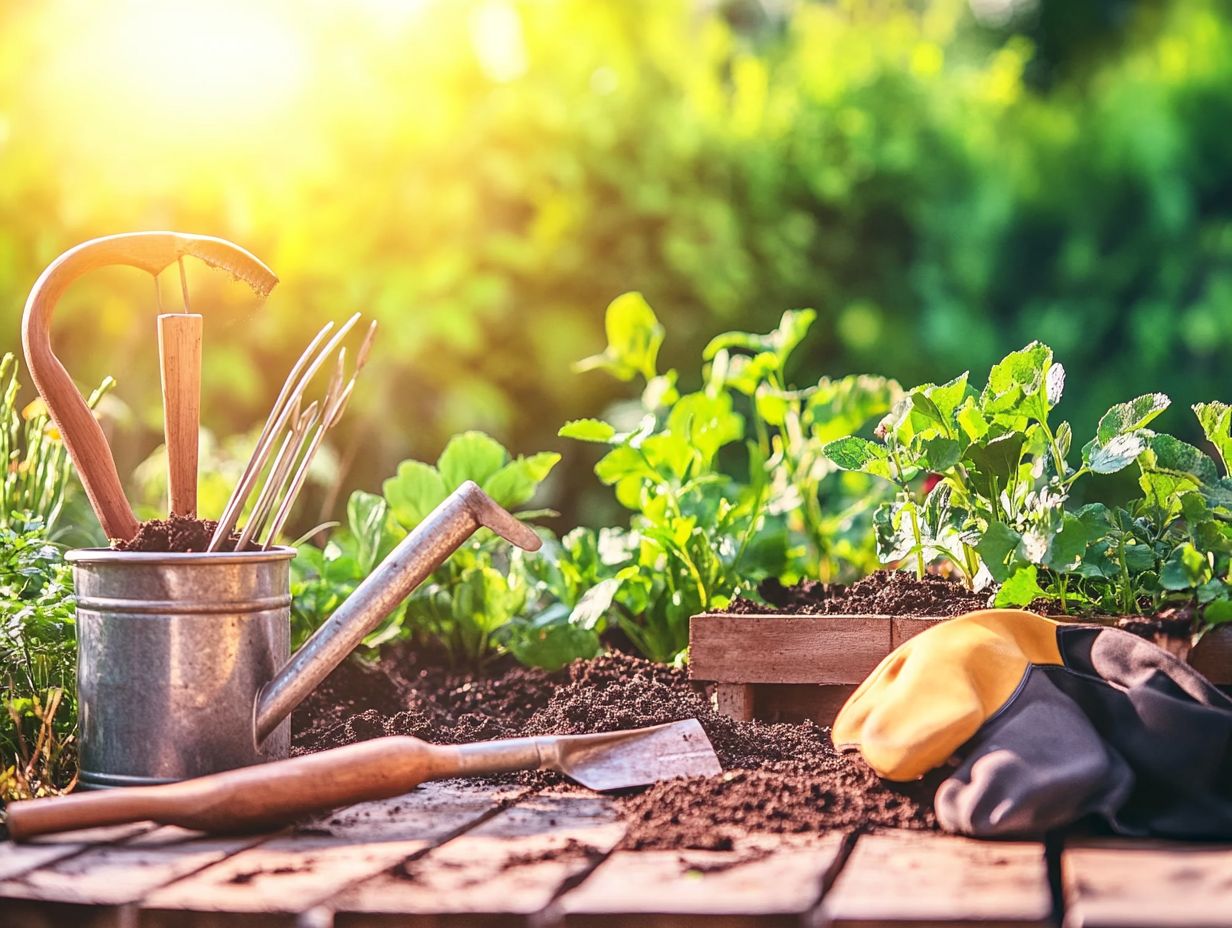
The 5 tools for effective soil fertility management every gardener should have for soil are a shovel, rake, hand trowel, soil pH meter, and compost bin.
Why is a shovel important for gardening?
You can’t garden without a trusty shovel! It’s key for digging and moving soil, which is necessary for planting and transplanting flowers, vegetables, and other plants.
Do I really need a soil pH meter?
Yes, a soil pH meter is crucial for determining the acidity or alkalinity of your soil, which is important for the health and growth of your plants. Utilizing proper gardening gloves can help protect your hands while taking readings.
What can a compost bin do for my garden?
A compost bin is a fantastic tool for creating nutrient-rich compost to add to your garden soil. This promotes healthy plant growth and reduces waste, making it an essential part of garden maintenance.
Can I use a hand trowel for more than just planting?
Definitely! A hand trowel is useful for a variety of gardening tasks, such as weeding, spreading mulch, and digging small holes for seedlings. Investing in ergonomic design tools can make tasks more comfortable.
Is a rake necessary for gardening?
Yes, a rake is essential for leveling and smoothing out soil, as well as removing debris and weeds from your garden beds. A garden rake works well with other tools for efficient garden care.

